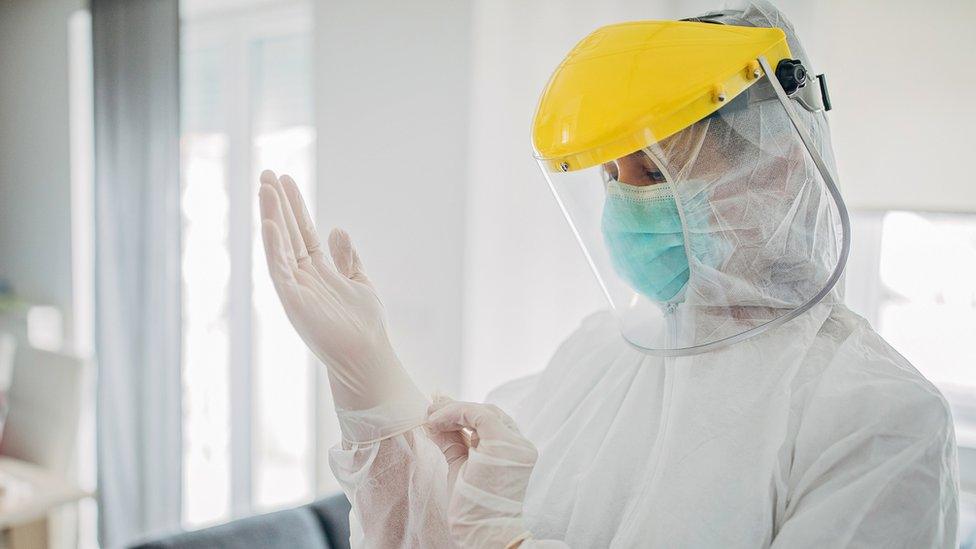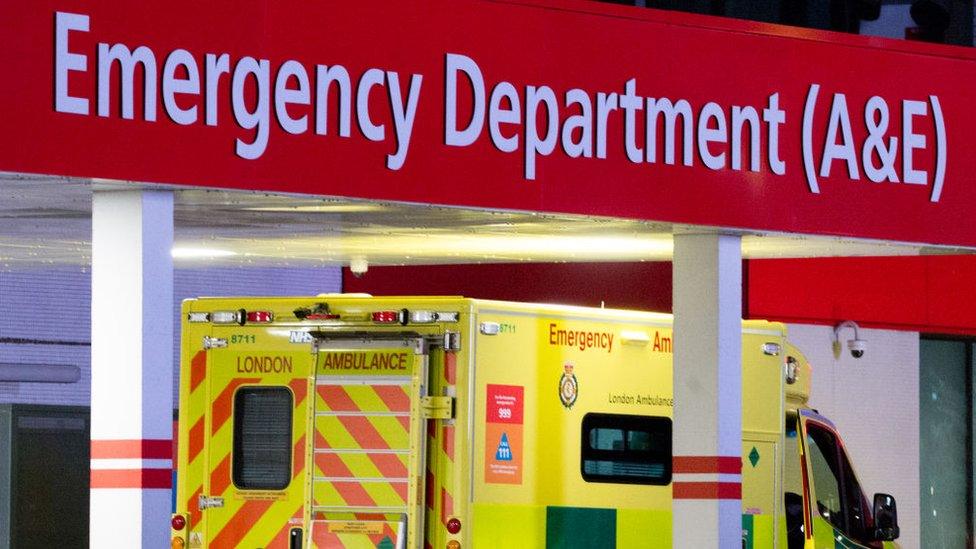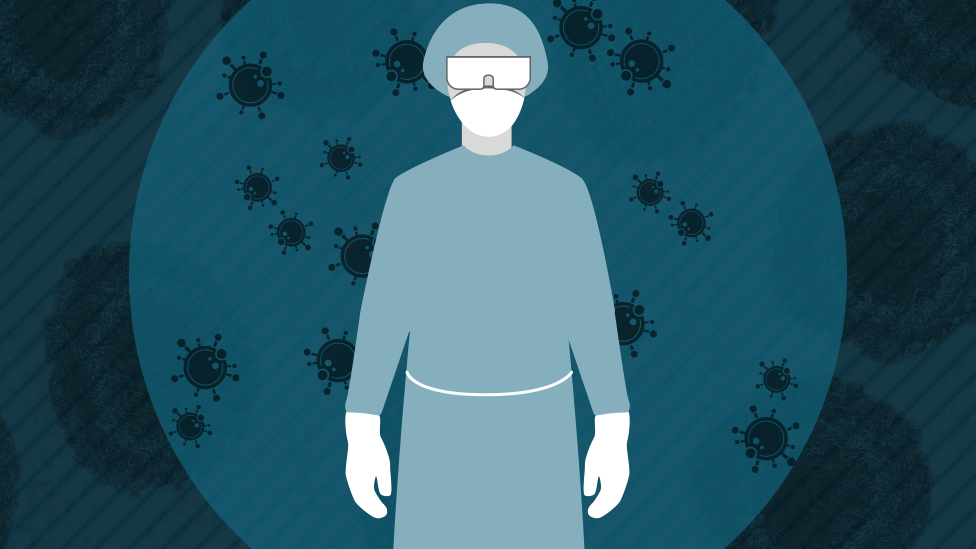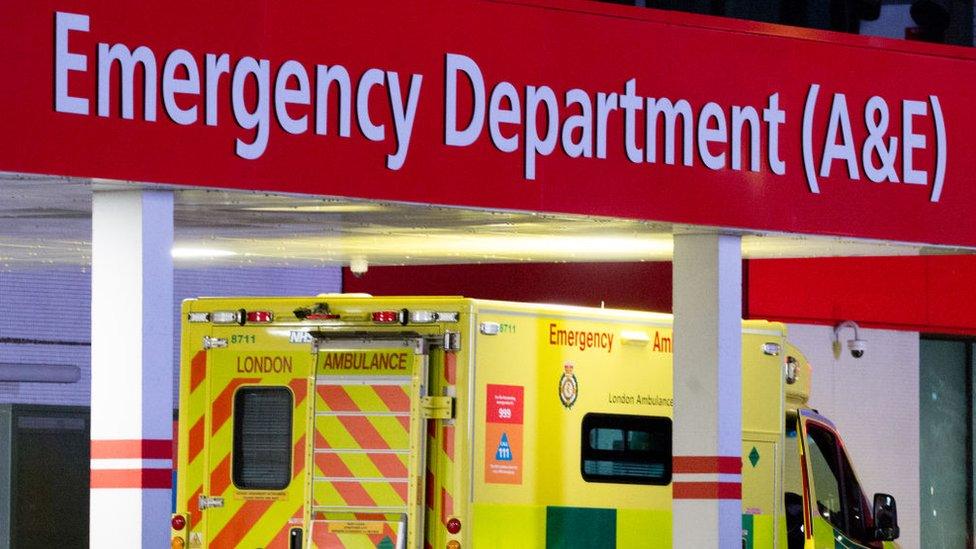Coronavirus: Reopening NHS services must be safe, unions say
- Published
- comments

Rapid testing and an adequate supply of protective equipment must be in place when the NHS reopens services cancelled during the peak of the coronavirus oubreak, health unions have said.
The unions have put forward a nine-point plan for the NHS to reopen safely as lockdown restrictions ease.
And staff working through the crisis should be paid overtime and a public sector pay freeze ruled out, they say.
The government has said it is working "around the clock" to provide more PPE.
NHS England has told hospitals to restart routine and non-urgent operations and procedures which were put on hold to create more capacity for Covid-19 patients.
But 16 unions, including Unison, the Royal College of Nursing, Unite and GMB, said they wanted the NHS to continue to operate a "safety-first" approach as outpatient clinics and operations resume.
They said they wanted to avoid a repeat of the PPE supply problems which "sapped" staff confidence and "caused widespread and unnecessary anxiety".
Access to readily available PPE was also important as employers in other parts of the economy begin to open up their workplaces and source protective kit for staff, they added.


Moving towards a "new normal" for NHS hospitals could be almost as big a challenge as coping with the immense pressure during the April peak of Covid-19 patient admissions.
That's the fear of health unions with their new call to ministers and health leaders in the UK's national administrations.
It comes after NHS England told hospitals to restart routine surgery and procedures. Unions want assurances on future supplies of personal protective equipment (PPE) which will be needed for non-urgent operations as well as intensive care.
They say members who have been working under great strain are vulnerable to burn out and should be rotated out of the most stressful environments.
They want to be convinced that social distancing will be properly observed in A&E. NHS England says new guidelines have been set out with staff and patient safety paramount.
But there is a lot of discussion still to be had about how the health service will attempt to cope with the backlog of postponed work as well as watching out for another spike in virus cases.

Unison's Sara Gorton, who also chairs the NHS group of unions, said the health sector faced another "crucial test" after handling the outbreak.
She added: "As hospitals get busier, and clinics and other services begin to reopen, the safety of staff and patients is paramount.
"But this can't happen without plentiful and constant PPE supplies.
"Tackling Covid has been a huge challenge, but this next phase will be a crucial test, too."

LOOK-UP TOOL: How exposed is your job?
SCHOOLS: When will children be returning?
EXERCISE: What are the guidelines on getting out?
THE R NUMBER: What it means and why it matters
UK SPREAD: How many cases in your area?

The unions represent more than one million workers across the UK, including nurses, midwives, 999 call handlers, cleaners, porters and paramedics.
Other measures in their plan include ensuring two-metre social distancing rules are maintained, allowing some staff to work from home and regularly redeploying staff working in high-risk areas to those under less pressure.
Some 40,000 staff who have returned to the NHS could be moved to help short-staffed areas, the unions say.
They also called for staff to be paid for every hour worked.
"Talk of future pay freezes to pay the bill for the pandemic will outrage nursing, health care staff and the public alike," said Hannah Reed, from the Royal College of Nursing.
The Daily Telegraph, external this week reported that a confidential Treasury assessment of the coronavirus crisis estimates it will cost the exchequer almost £300bn this year and could require measures including a two-year public sector pay freeze.

Figures released this week show the number of A&E visits in England has halved since the coronavirus outbreak started
Health experts have warned that it could take months to get the NHS back to normal.
Cancer screening has paused in Wales, Scotland and Northern Ireland - with few invitations sent out in England.
Figures released this week show the number of A&E visits in England has halved. since the coronavirus outbreak started, dropping to their lowest level since records began.
Danny Mortimer, chief executive of NHS Employers, "There should not though be a return to business as usual whether in the short, medium or long term, but a reset.
"Health leaders want to establish the impact of the last few months on staff and how best to improve how they are looked after for the longer term."
In other developments:
One of the biggest academy trusts in England says it will open all of its 35 primary schools on 1 June
A former top US health official has told Congress the country could face its "darkest winter in modern history" because of the coronavirus
One in 400 people in England is currently infected with the coronavirus, a survey of 11,000 people in households suggests

LOCKDOWN: How are businesses coping?
EVERYDAY HEROES: Stacey Dooley is on the hunt

- Published19 February 2021

- Published14 May 2020

- Published14 May 2020
